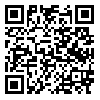Volume 5, Issue 1 (2023)
san 2023, 5(1): 5-29 |
Back to browse issues page
Download citation:
BibTeX | RIS | EndNote | Medlars | ProCite | Reference Manager | RefWorks
Send citation to:



BibTeX | RIS | EndNote | Medlars | ProCite | Reference Manager | RefWorks
Send citation to:
Baziyar A, Hemmati S, Salimi A, Zeinivand T. Th Reading Dystopian motifs in Frankenstein in Baghdad. san 2023; 5 (1) :5-29
URL: http://san.khu.ac.ir/article-1-329-en.html
URL: http://san.khu.ac.ir/article-1-329-en.html
Razi University Kermanshah , Sh.hemati@razi.ac.ir
Abstract: (1062 Views)
Dystopia, a significant literary subgenre, is diametrically opposed to the utopia that poets and writers longed to achieve. Dystopian literature broadly portrays the destructive consequences of political, social, and industrial clashes. In other words, this type of literary subgenre mirrors the dark side of the society which is replete with misery and agony. Since novels are mainly the product of societal events, dystopia is more widely reflected in novels than in other literary genres.
Ahmad Saadawi, a contemporary Iraqi novelist, in Frankenstein in Baghdad, has depicted life in Baghdad with extreme pessimism concerning the reality of human life in the contemporary world. In this novel, the author has depicted the dangerous effects of political and social structures on the future of humanity especially the people of Baghdad. He depicts the detrimental effects of the American invasion of Iraq leaving the country in an abysmal situation. The novel is a fearsome portrayal of such a torn-apart society. In every line of the novel, signs of dystopian life are horrifically pictured.
This research, based on a descriptive-analytical method, examines dystopian components such as moral degradation and degradation, criminal actions, deprivation of security, chaos, violence, destruction of peaceful life components, and enforced migration. The novel is a frightening image of a disjointed society plagued by unfortunate events.
Ahmad Saadawi, a contemporary Iraqi novelist, in Frankenstein in Baghdad, has depicted life in Baghdad with extreme pessimism concerning the reality of human life in the contemporary world. In this novel, the author has depicted the dangerous effects of political and social structures on the future of humanity especially the people of Baghdad. He depicts the detrimental effects of the American invasion of Iraq leaving the country in an abysmal situation. The novel is a fearsome portrayal of such a torn-apart society. In every line of the novel, signs of dystopian life are horrifically pictured.
This research, based on a descriptive-analytical method, examines dystopian components such as moral degradation and degradation, criminal actions, deprivation of security, chaos, violence, destruction of peaceful life components, and enforced migration. The novel is a frightening image of a disjointed society plagued by unfortunate events.
Send email to the article author
| Rights and permissions | |
 | This work is licensed under a Creative Commons Attribution-NonCommercial 4.0 International License. |





